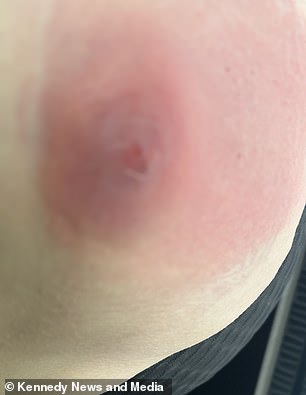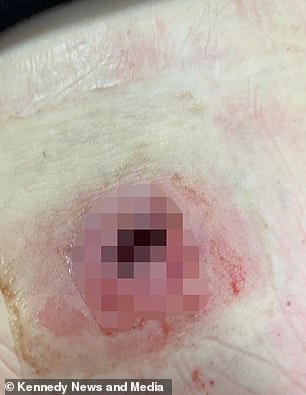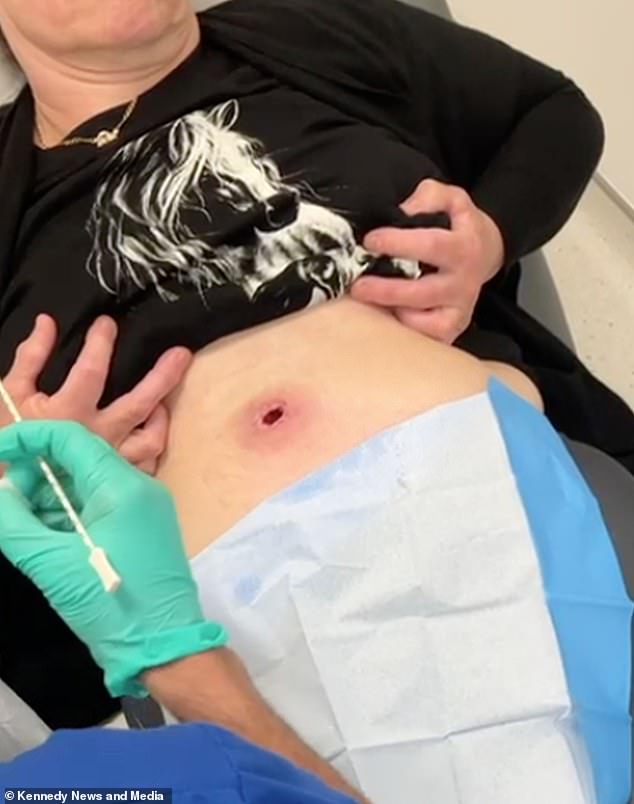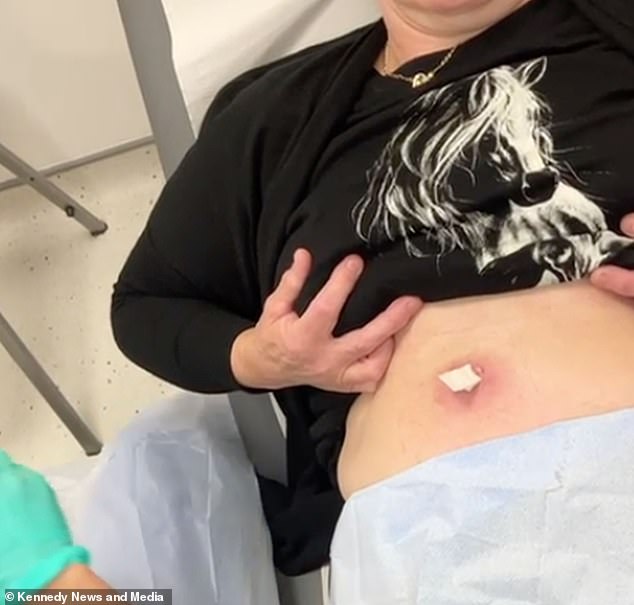A grandmother of ten’s “paranoid” nightly spider hunt didn’t stop one of them from sinking his fangs into her and leaving a gaping hole in her stomach.
Karen Ashmore, 56, who suspects she was bitten by a spider while hanging out washing, says she feels lucky to be alive after the bite turned into sepsis.
Ms Ashmore, who lives in Dukinfield, Manchester, initially ruled out the bite as a heat rash or a simple spot before the mark began to feel “sore and itchy”.
And when her skin began to peel off at the edges, she decided to visit her pharmacist, who informed her that she had been bitten by an eight-legged creature and that she should go to the hospital if the bite did not improve.
Days later, the wound worsened dramatically with Ms Ashmore’s stomach swelling, prompting her to rush to A&E where doctors told her the spider venom had caused an abscess in her stomach and she was currently battling sepsis.
Karen Ashmore, 56, who suspects she was unwittingly bitten by a spider while hanging out washing, says she feels lucky to be alive after the bite turned into sepsis.
The abscess, a collection of pus, needed to be urgently removed by surgery, leaving a hole the size of a £1 coin and about 2cm deep.
Although Ms Ashmore has made a full recovery, she is now warning others to be wary of Britain’s seemingly harmless arachnids.
“I was obsessed with spiders before all this happened. I would always shake my bedding before I went to sleep to make sure there weren’t any in there,” she said.
“I’m not scared of them, but I’m a little scared of having them in the house.”
Upon initially seeing the bite, which turned out to be much more serious than expected, she said: “I had just taken a shower and noticed I had a spot on my stomach.”
‘It was the size of a thumbtack. As the week went on, it started to hurt and itch, so I put some cream on.
“But then the skin started falling off at the edges, so I knew something was wrong. I didn’t know what had happened, I just saw a red spot.
‘I went to the pharmacy and they told me it looked like a spider bite. They gave me antihistamine cream and pills and told me that if there was no difference in three days, I should go to the hospital.
“But the circle around the bite kept getting bigger and my stomach was swelling.”


Ms Ashmore’s stomach began to swell, taking her to A&E where doctors told her the spider’s venom had caused an abscess in her stomach and she was currently battling sepsis. The abscess (left) urgently needed to be removed by surgery, leaving a hole the size of a £1 coin and 2cm deep (right).
Mrs Ashmore rushed to hospital and underwent urgent surgery to cut out a chunk of her stomach where the spider had sunk its fangs.
She said: ‘TheAt the hospital they said it had turned into sepsis and had developed into an abscess. They said it was so swollen it had to be removed.
“It was very painful. I didn’t know what to think. I went in at 8am the next day for emergency surgery. They wanted to remove the abscess.
“It was as big as a pound coin and the hole left was about two centimetres deep.”
Ms Ashmore was left with an open wound after the operation and will have to wait for the skin to grow back for the area to be fully healed.

Ms Ashmore was left with an open wound after the operation and will have to wait for the skin to grow back before the area is fully healed.

Ms Ashmore now urges others to always seek medical help if they spot a new suspicious spot on their body.
She said: ‘I was told my skin will always be very, very thin there. It has left me scarred for life.
“I never knew what kind of spider it was. You could see where it had stuck its fangs.
“I don’t know where it came from. It could have been in the laundry when I brought it home or it could have bitten me when I was cleaning the garden.”
Ms Ashmore now urges others to always seek medical help if they spot a new suspicious spot on their body.
She said: “I never thought a spider could cause this kind of damage. Sepsis is fatal. I could easily have lost my life. They said it was serious.
“Now (since the bite) I’m paranoid about all the bugs. I’m checking every nook and cranny in the house.
“I recommend anyone to go to the doctor as soon as possible if they see a new spot. I regret not going sooner.”

